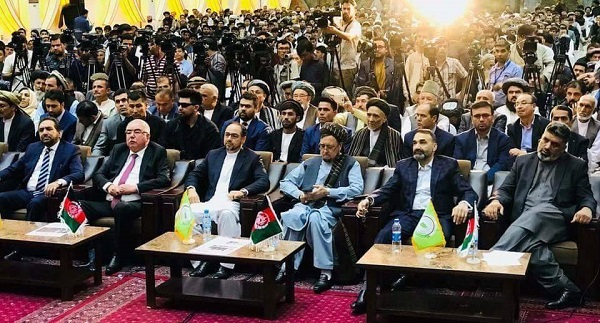Alwaght- Over the past few months, Afghanistan’s security situation deteriorated as ISIS terrorist group and Taliban intensified their attacks on cities and clashed with the police and army forces across the country. Meanwhile, the political scene has never been better and it even worsened over the recent days as Kabul has witnessed rifts between various political parties and the government.
In late July, 35 political factions involving many of the former rebel leaders and the current unity government’s officials formed a coalition, dubbed Grand National Coalition of Afghanistan (GNCA), which they say intends to help the war-torn nation out of the security crisis.
The Afghan government responded to the initiative by saying that it will soon hold consulting meetings with its members, adding that it advocated establishing legal alliances for the good of the people and country’s interests.
Some former commanders, politicians, government officials, and civil activists dismissed the coalition as lacking a cohesive political view and leadership, saying that with regard to the past experiences such an alliance will not live long.
Alwaght has talked to Dr Mohammed Molazehi, an Afghanistan affairs expert, to get a picture of the new bloc and its objectives.
Answering a question about the factors behind GNCA’s foundation, Mr Molazehi said that as the Afghan government makes final preparations for the parliamentary and local elections the government-run Independent Election Commission tries to impair figures who are at loggerheads with the president, even those who are part of the government. Feeling the danger, the Jihadi leaders have founded the Grand National Coalition. Some of the government officials and anti-government lawmakers were disqualified for the upcoming polls by the electoral body under various excuses. The issue has been worrisome to the government critics.
The expert named the parties forming the bloc as:
- Uzbek National Front, led by General Abdul Rashid Dostum.
- Jamiat-e Islami Party, CO-led by Atta Muhammad Nur who is at odds with Ashraf Ghani’s government.
- Hizb-i Wahdat party, a predominantly Shiite party led by Muhammed Mohaqiq.
The three parties coalesced under GNCA in opposition to President Ashraf Ghani who they think is working to weaken the mujahideen and non-Pashtun forces. The three parties previously formed Afghanistan Salvation Front (ASF) in Ankara. The ASF is now integrated into the new bloc, a move meant to expand the coalition to the Pashtun-majority areas like Paktia and Kandahar. The two provinces have representatives in the new alliance.
“The Turkish-based party was inefficient as it was formed by the non-Pashtun groups. But Pashtuns are now part of the fresh alliance with the aim of influencing the elections. But with regard to the short time left to the elections, it is not clear how successful it will be, especially that a fourth front led by Yunus Qanuni, Ismail Khan, and some rebel leaders have declined to join the coalition,” Mr Molazehi added.
Asked about the goals the coalition has set, Afghanistan affairs expert said that major goal is amending the constitution, changing the presidential system to parliamentary one, and so reviving the prime minister post.
He continued: “The Grand National Coalition’s solution is forming Loya jirga (grand assembly) according to an agreement reached by the national unity government upon its formation in 2014. The initiative was proposed by the former US Secretary of State John Kerry. To date, Ghani has refused to accept. The president has not yet formed Loya jirga nor finalized the status of the chief executive post which is unconstitutional. According to an agreement, Loya jirga was planned to form within two years to reform law and reinstate prime minister post and transform political system from presidential to parliamentary. But Ghani did not do any of the agreement terms.”
These are the main demands of the coalition which also wants preserving the national security beyond the ethnicity and religious borders. The coalition seeks to replace the sectarianism with nation-building process. Economically, the alliance is raising anti-corruption resolution.
Touching on the bloc’s dealing with Taliban, Dr Molazehi noted that it is resolved to fight the militant group. It will not reach a compromise with the group because its views are deeply different. Taliban eyes an authoritarian government without rights for non-Pashtuns, particularly the Shiite Hazaras. So, it will not agree to a power-sharing government with Taliban. GNCA argues that Ghani seeks to compromise parts of the country to the armed organization as part of a deal. Even at the present time, there are signs the government is retreating from some rural areas under the ruse deploying them into urban areas, thus paving the way for their fall to Taliban.
“The Grand National Coalition strongly opposes this move, believing that should Taliban take official power in southern and eastern regions, others like ethnic Tajiks, Uzbek, and Hazaras should also be granted local powers. They also want constitutional changes to open the road for ethnic groups’ share in the central government. The idea is on a collision course with Taliban's ambitions for autocratic governance.”
Mr Molazehi also answered a question on the future of the coalition and its role in Afghanistan’s politics, saying such alliances are fragile because they are occasional and formed to address the elections. Just contrary to their claims of patriotism they are mainly concerned about their own political base in rivalry against Ghani. They are afraid that the president’s party win the parliamentary and local polls. The founding parties are worried that once Ghani wins, he will strike a deal with Gulbuddin Hekmatyar and parts of Taliban who may put arms down in return for a share in the government. Such a deal will undermine the Uzbek and former jihadi groups. This means the coalition is seeking election objectives and once the government offers its components privileges, it will dissolve.



























